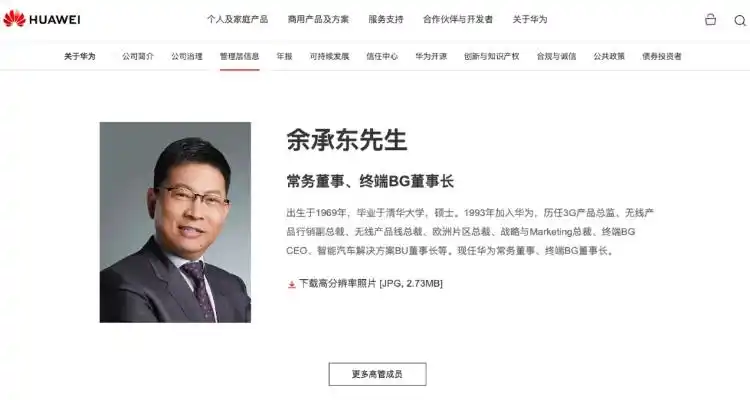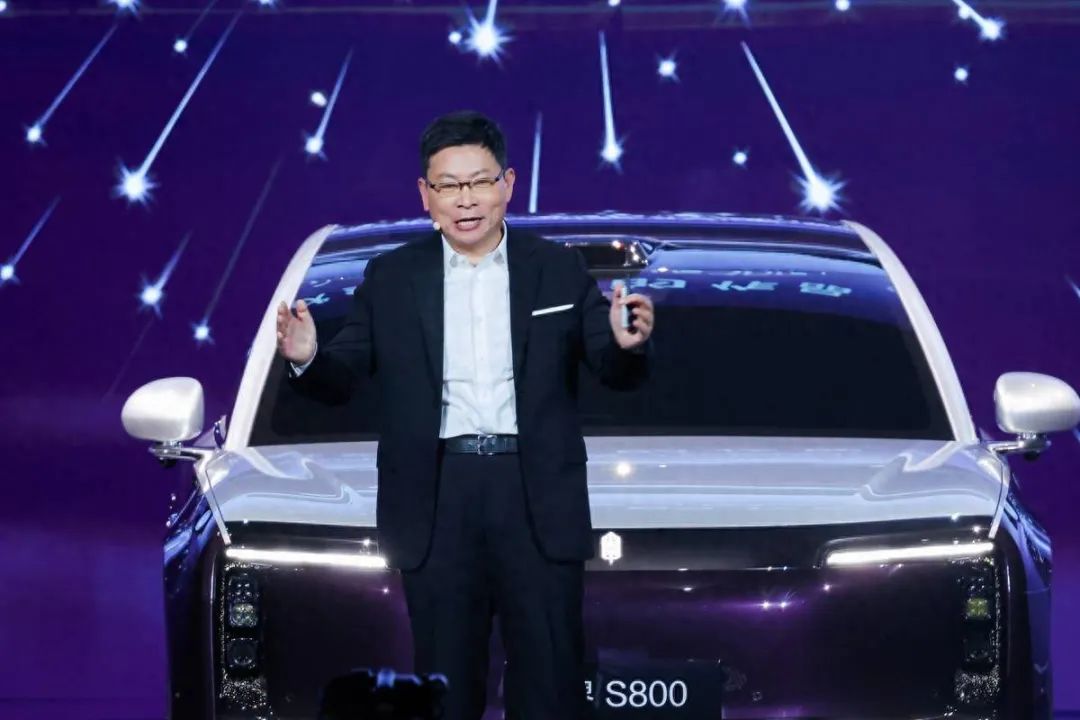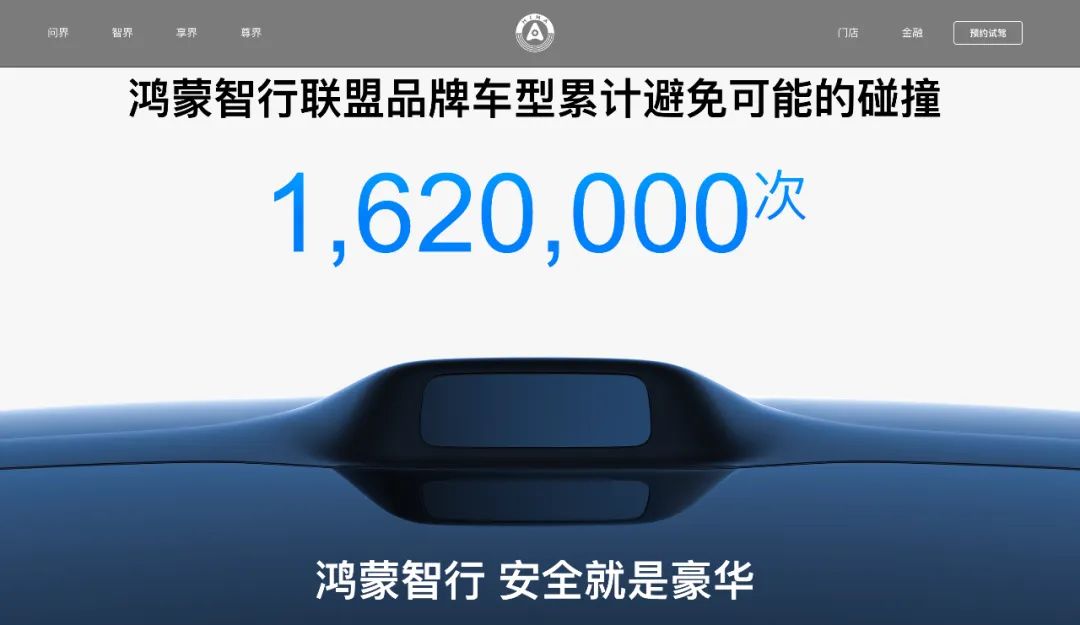Yu Chengdong Steps Down from Vehicle BU, Signaling Huawei's Mature Automotive Strategy
![]() 04/07 2025
04/07 2025
![]() 739
739
Yu Chengdong lightens his load but not his responsibility.
Recently, Huawei's official website updated Yu Chengdong's bio, now listing him as Executive Director of Huawei and Chairman of Terminal BG, excluding his previous title as "Chairman of Intelligent Automobile Solution BU," which now appears solely under his "past" experiences. Concurrently, his relevant position descriptions were removed from his personal Weibo and Douyin accounts.

Regarding this adjustment, social media has buzzed with various interpretations, primarily categorized into two: some speculate that Huawei is sidelining Yu Chengdong, demoting him to prevent unauthorized statements; others postulate a more far-fetched theory, blaming Huawei for Xiaomi's SU7 incident, accusing it of exaggerating the concept of "intelligent driving."
Both are conspiracy theories. The truth is straightforward: Yu Chengdong's resignation reflects not only normal business transitions but also Huawei's mastery of its "car manufacturing" model, clarifying its automotive business path.
This holds two implications: firstly, Huawei's commitment to "not manufacturing cars, but helping automakers build and sell good cars" will be reinforced and resolutely implemented in the coming years. Secondly, Huawei's automotive business has transitioned into a "dual-track" mode, where Yu Chengdong is not abandoning the automotive sector but rather focusing more on Huawei's terminal and HarmonyOS Intelligence.
The former is tied to the change in the primary entity of Huawei's Vehicle BU, Shenzhen Yinwang Intelligent Technology Co., Ltd. (hereinafter referred to as "Shenzhen Yinwang"), which has completed its business transformation, enabling Vehicle BU to operate independently through Shenzhen Yinwang.
According to Tianyancha, Shenzhen Yinwang's legal representative has changed to Xu Zhijun. Huawei's shareholding in Shenzhen Yinwang has been adjusted from 100% to 80%, with two new major shareholders, AITO Technology (Chongqing) Co., Ltd., and Thalys Automotive Co., Ltd., each holding 10%.
In terms of Shenzhen Yinwang's management, Xu Zhijun was elected Chairman of the board of directors, with Yu Chengdong and Zhu Huarong as Vice Chairmen. Bai Yi, Jin Yuzhi, Bian Honglin, and Zhang Xinghai serve as directors. Notably, Zhu Huarong is the Chairman of Changan Automobile and AITO Technology, while Zhang Xinghai is the Chairman of Thalys.
Currently, Xu Zhijun's position on Huawei's official website is Deputy Chairman and Rotating Chairman, with no mention of Yinwang. This signifies that the Vehicle BU's main entity is no longer directly under Huawei.
This business transformation marks the official incorporation of Huawei's Vehicle BU into Yinwang, transitioning from an internal R&D department to a market-oriented solutions provider, expanding technology output through open collaboration.
The establishment of Shenzhen Yinwang embodies Huawei's "not manufacturing cars" strategy, aiming to package the technology and resources of the Vehicle BU into a diversified equity-based technology open platform.
In essence, Huawei aims to transform the Vehicle BU from a sole technology solution provider into a "demand + supply" fusion community, aligning with Yinwang's positioning as an "open platform with the participation of the entire automotive industry," sharing technology and capabilities across the sector.
Since first proposing the "not manufacturing cars" strategy in 2019, Huawei has reinforced this stance through multiple public statements. For instance, in 2024, Thalys acquired the AITO trademark, reinforcing Huawei's commitment to assisting automakers in building and selling cars rather than directly participating in manufacturing.
A Ping An Securities research report predicts that, post-independent operation, Huawei's Vehicle BU could become the "Bosch" of the smart car era, with a revenue scale ranging from 127.5 billion to 165 billion yuan upon maturity. Assuming a 15% net profit rate, the corresponding annual net profit would be between 19.1 billion and 24.8 billion yuan.
HarmonyOS Intelligence is Huawei's leading smart car technology ecosystem alliance, empowering automakers through ICT technology, promoting automotive intelligence, and offering smart travel solutions. Its core strategy is "focusing on terminal business, not manufacturing cars, but deeply participating in automotive intelligence.
Currently, HarmonyOS Intelligence offers four major solutions for partners: intelligent driving, intelligent cockpit, intelligent driving control, and software-defined vehicles, creating unique automotive ecosystem application scenarios with a high "Huawei content".
Previously, Huawei developed its automotive business through three models: component supply, Hi model (cooperation with automakers, providing full-stack smart car solutions), and HarmonyOS Intelligence model (formerly known as "Intelligent Selection"), involving deep collaboration in R&D, sales, and promotion. These models fell under different business departments, with the component supply and Hi models under Vehicle BU and HarmonyOS Intelligence under Terminal BG, known for Huawei's mobile phones, computers, tablets, headphones, and other end-user products.
After Shenzhen Yinwang's transformation, Yu Chengdong's role was adjusted, clarifying his division of labor with Xu Zhijun. HarmonyOS Intelligence and Yinwang now undertake distinct missions, defining Huawei's automotive route as a "dual-track" structure: flagship products to tap the market and an open ecosystem to expand its territory.

Ren Zhengfei once explained Huawei's decision-making shift from "one person is a team" to "letting those who hear the sound of gunfire make decisions." Yu Chengdong's position has evolved multiple times over the past year, from CEO to Chairman of the Vehicle BU and Terminal BG, each adjustment "lightening his load but not his responsibility." As a former Huawei veteran puts it, Yu Chengdong is a doer who "actually accomplishes things."
This is evident in Huawei's financial reports. During Yu Chengdong's tenure as Chairman of the Vehicle BU, HarmonyOS Intelligence witnessed a surge in sales. In 2024, HarmonyOS Intelligence delivered a cumulative total of 445,000 new vehicles, ranking first in average transaction price among Chinese automotive brands.
Driven by this, Huawei's vehicle business revenue in 2024 reached 26.353 billion yuan, a 474.4% year-on-year increase, making it Huawei's fastest-growing business segment. According to Meng Wanzhou, Huawei's Intelligent Automobile Solution achieved profitability for the first time that year, a year earlier than Yu Chengdong's previous commitment of 2025.
For Yu Chengdong, the responsibility of "capturing territories" in the future remains significant. However, he must also learn from the Xiaomi SU7 incident: the traffic generated by an entrepreneur's IP or internet celebrity status is a double-edged sword—boosting sales but also risking backlash.

When the public disenchants with "personality economics" and the traffic wanes, only product safety and respect for life can validate a company's "conscience." This aligns with Yu Chengdong's sentiment, "Safety is the ultimate luxury, and all costs are worth it!"








